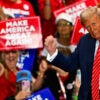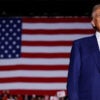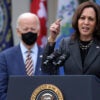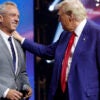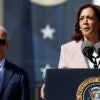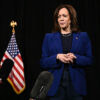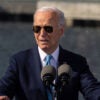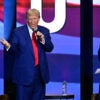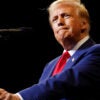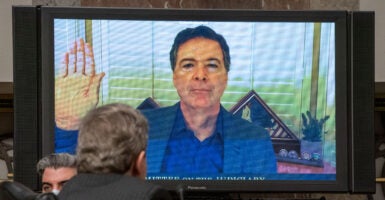Former FBI Director James Comey took questions from a Senate committee for almost four hours Wednesday, but had the same answers for many of them.
Comey, who President Donald Trump fired in May 2017, fielded questions remotely by video link primarily about the FBI’s Russia-Trump investigation, code-named “Crossfire Hurricane,” before the Justice Department named a special counsel to take up the matter.
Throughout the Senate Judiciary Committee hearing, in which he gave sworn testimony, Comey repeatedly offered the responses “I don’t know,” “I know nothing about … ,” “I don’t recall,” “I don’t remember,” “I only know what is in the public record,” “I can’t answer that,” and “That doesn’t ring a bell.”
Comey also said, “I don’t know anything about the facts that have recently been revealed about the subsource.”
In another often-repeated variation, Comey frequently responded to senators by questioning their questions, saying, “I don’t agree with your characterization,” “I don’t agree with your preamble,” or “I don’t agree with your predicate.”
Justice Department Inspector General Michael Horowitz found numerous flaws in the FBI investigation in a report last year—primarily with regard to the agency’s surveillance of Trump campaign associate Carter Page.
In some instances, Comey did answer senators’ questions. Here are four examples.
1. ‘Proud’ of Russia Investigation
Senate Judiciary Chairman Lindsey Graham, R-S.C., asked the former FBI director: “How would you rate the Crossfire Hurricane investigation in terms of being done thoroughly, by the book, and an investigation the FBI should be proud of?”
Comey responded, “Overall, I’m proud of the work. There are parts that are concerning, which I’m sure we’ll talk about. But overall, I’m proud of the work.”
Later in the hearing, Sen. Ted Cruz, R-Texas, asked broadly about the Russia probe as well as the investigation of former Trump national security adviser Michael Flynn and misinformation in the application for a warrant to surveil Page, the Trump campaign adviser.
“Was that handled in a competent and honest way?” Cruz asked.
Comey, who signed off on the warrant application and subsequent renewals, continued with his “overall” defense.
“I think the overall investigation of the Russia interference and whether Americans were associated with it was conducted in an honest, competent, independent way,” Comey said.
Cruz noted that Horowitz’s report found 17 significant omissions in the FBI’s application for the initial warrant to spy on Page under the Foreign Intelligence Surveillance Act, or FISA.
“So, in your view, 17 mistakes and lying to the court is competent and honest?” Cruz asked.
Comey responded of the inspector general: “I don’t believe he concluded they were lies to the court. There were significant failings with how the Carter Page FISA [application] was prepared and renewed.”
Cruz brought up Kevin Clinesmith, the FBI lawyer who pleaded guilty in August to altering information in a CIA email, leaving out information that Page had worked with the CIA.
“That fraudulent document was then used as the basis for a fraudulent submission to the FISA court. Do you believe that is honest and competent?” Cruz asked.
Comey replied, “I don’t believe you offered an accurate summary.”
Cruz wrapped up by calling the FBI’s probe corrupt and hinting that Comey was corrupt:
This investigation of the president was corrupt. The FBI and the Department of Justice were politicized and weaponized. In my opinion, there are only two possibilities: that you were either deliberately corrupt or woefully incompetent. And I don’t believe you were incompetent. This has done severe damage to the professionals and the honorable men and women at the FBI, because law enforcement should not be used as a political weapon. That is the legacy you have left.
Later, Sen. John Cornyn, R-Texas, referred to a notorious compilation of anti-Trump material compiled by Christopher Steele, a former Bristish intelligence agent, and financed by the Democratic National Committee and the Hillary Clinton campaign.
Cornyn asked Comey: “Did you call the Steele dossier salacious and unverified?”
Comey: “The entire dossier was something we were trying to see if we could rule in or rule out.”
Cornyn: “Are you aware of any verification by the FBI?”
Comey seemed unsure before eventually responding: “I learned a lot about the Steele material and the subsource interviews from the Horowitz report that I didn’t know before.”
2. Russia and Hillary Clinton’s Campaign
Director of National Intelligence John Ratcliffe sent a letter to the Judiciary Committee regarding declassified information on how Hillary Clinton’s presidential campaign pushed the Russia investigation to distract from her own campaign problems.
“In late July 2016, U.S. intelligence agencies obtained insight into Russian intelligence analysis alleging that U.S. presidential candidate Hillary Clinton had approved a campaign plan to stir up a scandal against U.S. presidential candidate Donald Trump by tying him to Putin and the Russians’ hacking of the Democratic National Committee,” Ratcliffe’s letter says. “The IC [intelligence community] does not know the accuracy of this allegation or the extent to which the Russian intelligence analysis may reflect exaggeration or fabrication.”
The letter from the director of national intelligence goes on to say:
On 07 September 2016, U.S. intelligence officials forwarded an investigative referral to FBI Director James Comey and Deputy Assistant Director of Counterintelligence Peter Strzok regarding ‘U.S. presidential candidate Hillary Clinton’s approval of a plan concerning U.S. presidential candidate Donald Trump and Russian hackers hampering U.S. elections as a means of distracting the public from her use of a private mail server.’
Graham asked Comey: “Do you recall getting an inquiry from the intelligence community in September of 2016 about a concern that the Clinton campaign was going to create a scandal regarding Trump and Russia?”
Comey, as he did for much of the hearing, responded, “I do not,” and added: “That doesn’t ring a bell.”
Later, Sen. Patrick Leahy, D-Vt., asked about the appropriateness of the director of national intelligence’s releasing the letter.
“I don’t understand Mr. Ratcliffe’s letter well enough to comment,” Comey responded to Leahy. “It’s confusing. I think it contains in it a statement that is unverified information. I really don’t know what he’s doing.”
3. If Comey Knew Then What He Knows Now
For someone not known for introspection, Comey made a significant statement about how the FISA warrant application should have been done differently.
Graham asked, “Knowing then what you know now about all the things that we have come to find, would you have still signed the warrant application against Carter Page in October, January, and April?”
Comey was clear that he wouldn’t have signed off.
“No. I would want a much more complete understanding,” he said, adding: “The answer is no. Not without a much fuller discussion of how they were thinking about their disclosure obligations to the court.”
The problems with the FISA application that contained 17 errors and omissions was a key topic.
Clinesmith’s guilty plea, for deleting from an email the fact that Page worked with the CIA, came up several times.
“Do you now agree that the CIA confirmed that Mr. Page was in fact helping them?” Graham asked Comey.
“I know from the Horowitz report because the CIA confirmed he was what they call a contact,” Comey said, adding, “I did not know the nature of his relationship with the CIA. I’m telling you what I read in the Horowitz report.”
Graham: “Why is Mr. Clinesmith facing criminal indictment?”
Comey: “I only know what is in the public record. … I know nothing about Mr. Clinesmith.”
When Graham pressed him on Clinesmith’s conduct, Comey said, “Any false statement in the course of an investigation is deeply disturbing.”
Later, Sen. Mike Lee, R-Utah, seemed stunned by how little Comey knew about the probe’s problems.
“With all due respect, you don’t seem to know anything about an investigation that you ran,” Lee said.
Lee also noted that he met with Comey after President Barack Obama nominated him to be FBI director, and the two discussed the responsible administration of the Foreign Intelligence Surveillance Act.
Comey said there were problems with the FISA application to surveil Page, and with other applications.
“I agree with you, there are serious reasons to worry about the FISA process. The inspector general found errors in every FISA application. That’s a really important thing to dig into,” Comey said.
Lee said the FISA process itself must be deeply reformed—specifically an ex parte process, or when only one side is presented to a court.
“You don’t install a wasp nest in your child’s bedroom and then express surprise when your child gets bitten by wasps,” Lee said, adding:
You don’t adopt an ex parte process and then express surprise and outrage when it goes completely unsupervised and off the rails. This is an issue that is neither Republican nor Democrat, neither liberal nor conservative. It is a constitutional issue. This is a moral issue.
4. What Comey Says Obama and Biden Didn’t Do
Sen. Dianne Feinstein, D-Calif., the ranking member of the committee, addressed questions that emerged about whether President Barack Obama and Vice President Joe Biden, in the waning days of the Obama administration, pushed the FBI investigation of Flynn after his “unmasking” in intelligence intercepts at the request of one or more administration officials.
Feinstein asked: “Did President Obama or Vice President Biden ever ask you to investigate a political rival or to go easy on a political rival?”
Comey replied: “Never.”
Feinstein: “Why would that have been problematic?”
Comey said that such an order would politicize the FBI, adding:
Because it would compromise the independence of the Justice Department and the FBI’s work if it’s a criminal case or a counterintelligence case. It would introduce politics into what should be a fact-driven process.





